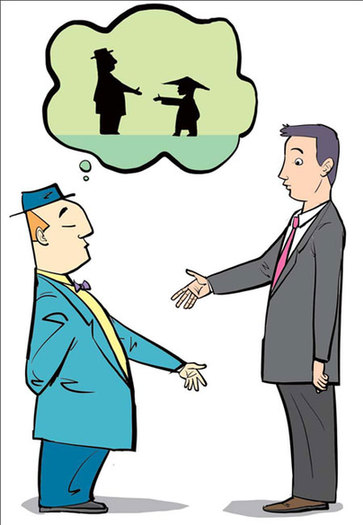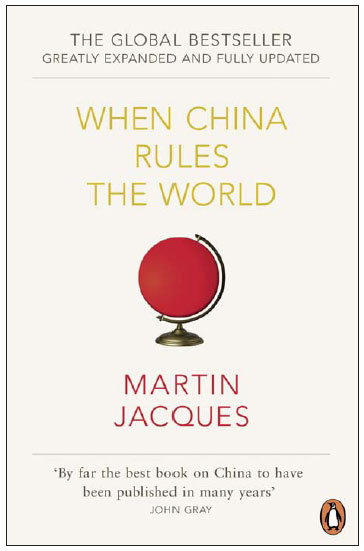Europe ill-prepared for China's rise
Updated: 2012-04-06 08:44
By Martin Jacques (China Daily)
|
|||||||||||
 |
But since 2000, the picture has changed dramatically. The story of China's transformation has assumed a wider meaning: no less than the transformation of the world. With the Chinese economy well over half the size of America's - and now predicted to overtake it around 2018 - a growth rate of around 8 per cent means that the country is having an increasingly profound and far-reaching effect on the rest of the world. And, as China's economy gets ever larger and its rapid growth continues, then the impact of China on the world will accelerate.
One only has to compare the number of countries for which China was the main trading partner between 1992 and 2010. In 1992 there were hardly any - if any indeed - and all would have been in East Asia. By 2001, there were several, but only in East Asia. Just nine years later, in 2010, there were many countries all around the world including Brazil, Egypt, South Africa, India, Pakistan, Chile, Argentina, Sudan and Australia, while China was established as the main trading partner for most East Asian countries. It is not fanciful to imagine that by 2020 China will be the main trading partner for countless countries all over the world. The transformation in trading patterns, moreover, is only one example of the global impact of China's rise.
Given the sheer speed and scale of China's transformation of the world, and the fact that there is no historical precedent, there is an obvious question: will the world be able to cope with it? The biggest single challenge, of course, is to China itself. It is one thing to deal with the domestic ramifications, difficult as these are and will continue to be, another altogether to handle the global impact. The foreign policy challenges are and will be enormous. It will necessitate a profound shift in the nature of Chinese foreign policy over the next few years.
Let us take the European response as one instance of the wider global response. Until very recently, Europe has been in denial of China's rise. Even now, in Britain for example, while there has been growing recognition of China's economic rise, there is little understanding of what it might mean. While there is huge coverage of the US presidential election, there is far less about the build-up to the once-in-five-years national congress of the Communist Party of China. In constant references to the "international community" - be it over Syria, Libya, Egypt, Somalia, or wherever - the media invariably treat the phrase as synonymous with the West, thereby excluding China (along with the rest of the world).
In other words, the idea of China as a major player that needs to be treated as an equal, rather than a subordinate outsider, is not yet accepted.

This is reflected in the European attitude toward China itself. The reflex action in response to any mention of China - be it from the elite or the ordinary person - tends to be: no democracy, bad human rights, poor environment. While acknowledging China's economic rise, the prevailing attitude is still largely dismissive. In the same vein, European governments have taken it upon themselves to lecture the Chinese on their shortcomings.
The mentality has deep historical roots. Europeans, having dominated the world - along latterly with the US - for 200 years, effortlessly assume that they know best, that their system is superior to all others, that the road of enlightenment is to follow the Western path and become a Western-style society, that the West provides the universal measure for all other societies and which thereby gives Westerners the right to sit in judgment on others.
That is why Westerners are prone to display a haughty attitude of superiority toward the Chinese. Deep down they do not view the Chinese as their equals. It is the legacy of Western imperial history.
For Europe, though, it is a dangerous attitude. Until recently, most Europeans have rather assumed that China's economic rise would be cut short by the country's political shortcomings: many, indeed, still believe that unless China adopts a Western system of government then it will inevitably fail. One of the consequences of this kind of thinking is that Westerners have made little effort to understand China in its own terms. Instead of having an open mind, they have closed minds. Rather than trying to understand - and learn from - the Chinese experience, they insist on viewing it through a Western prism. The Western mentality toward China is based on an arrogance which begets ignorance, an unwillingness to move outside its cultural comfort zone. There are many exceptions, but alas this remains the dominant cultural attitude.
As a result, Europe is extremely ill-prepared for China's rise. There are too few experts, too little coverage, too little knowledge of the extent of China's transformation and very little understanding of what it might mean for Europe. As one British friend, who lives in Shanghai and knows China very well, once rather colorfully said to me: "Europe is sleep-walking into oblivion."
At the end of October, after one of the many European summits on how to save the euro, French President Nicolas Sarkozy phoned President Hu Jintao seeking a huge loan from China; the following day the head of the European rescue fund flew to Beijing to reinforce the request. To many Europeans, the plea came as a bolt from the blue. The idea that Europe was on its financial knees and that China might ride to the rescue as its white knight was a scenario for which two centuries of supremacy had left them totally unprepared.
The last occasion on which Europe had been in such a situation was in the immediate aftermath of World War II when it turned to the US for assistance and received Marshall Aid. But the US is no longer in a financial position to help.
Suddenly Europeans were brought face to face with the reality of the enormous global shift that has been taking place of which previously they had been only dimly aware. It was a shocking moment: the shattering of the presumption of European ascendancy, a dawning realization that the global pecking order was changing. And the bleak outlook for Europe only serves to compound matters: many years of close to zero growth, the steady erosion of social provision and falling living standards. From having been for so long at the epicenter of global affairs, Europe finds itself drifting toward the global margins. And the rise of China, while not the only reason, is the major cause of this reconfiguration.
How will Europe respond to this process? Alas, belatedly - while combined with a continuing sense of denial. The pattern of European trade serves as a powerful metaphor for the fate that awaits it. Unlike the US, Europe's trade with China, as a proportion of its total trade, remains very small. Britain, for example, exports more to Ireland than China, India, Brazil and Russia combined. The most successful European exporter to China is Germany, which has carved out a very important niche in high value-added capital goods.
The danger facing Europe in an increasingly China-centric world is that it will be increasingly confined to the sidelines, isolated from the engines of growth and change in the developing world.
To forestall this will require a profound change in the European psyche: toward modesty, humility, openness, respect, equality and engagement rather than aloofness, haughty superiority, hectoring and disinterest. History, though, weighs heavily on Europe's shoulders: it is not easy to shed the intellectual and emotional baggage of 200 years. The task is urgent: time waits for no country or continent. The longer Europe fails to understand, the greater the price it will pay.
Martin Jacques is the author of the global best-seller When China Rules the World: the End of the Western World and the Birth of a New Global Order. The second edition, hugely expanded, updated and revised, was published in English last week. The views expressed in the article do not necessarily reflect those of China Daily.
Today's Top News
Rescuers race against time for quake victims
Telecom workers restore links
Coal mine blast kills 18 in Jilin
Intl scholarship puts China on the map
More bird flu patients discharged
Gold loses sheen, but still a safe bet
US 'turns blind eye to human rights'
Telecom workers restore links
Hot Topics
Lunar probe , China growth forecasts, Emission rules get tougher, China seen through 'colored lens', International board,
Editor's Picks

|

|

|

|

|

|





